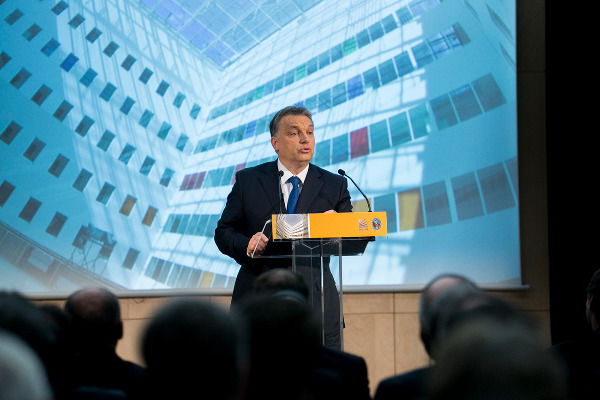| |
|
|
 |
Position of Fidesz on the Common Energy Policy of the European Union
|
Fidesz strongly opposes the recent announcement of Prime Minister Gyurcsány on supporting a Russian pipeline project over the EU's attempts to diversify energy sources and transit routes. The decision of the socialist-led Hungarian government demonstrates the need for a common European energy policy, and the results of the Berlin European Council are welcome in this regard - supposed that further steps are down the way. |
Created: 28th September, 2007 14:51 | Last updated: 8th November, 2007 19:59 |
 print print
|
 send send
|
|
|
|

Hungary chooses Russia over the EU?
After months of hesitation and opaque communication, the socialist-led Hungarian government seems to have clearly opted in favour of the Russian Blue Stream gas pipeline project as opposed to the EU-sponsored Nabucco program aimed at diversifying Europe's energy supply. In an interview given to the International Herald Tribune (12 March 2007), Prime Minister Ferenc Gyurcsány stated: "The Nabucco has been a long dream and an old plan...But we don't need dreams. We need projects... You can only heat the apartments with gas and not with dreams." Saying that Hungary would support the Russian plans despite being a member of the Nabucco consortium, Mr Gyurcsány added: "Blue Stream is backed by a very strong will and a very strong organizational power...and there is capacity behind it."
By giving green light to Blue Stream (though no formal decision is known yet), Hungary has not only delivered a blow to the evolving common energy policy of the European Union, but also boosted Russian attempts to monopolise the European energy market. Unfortunately, the state-owned Gazprom does not act as a genuine market actor, and seems to be pursuing geopolitical positions in downstream assets instead of maintaining upstream infrastructure - a tendency which raises question marks as regards supply security in view of rapidly increasing demand projections and Europe's own depleting sources. This assumption is further reinforced by the fact that Russia is increasingly using hydrocarbons as a political weapon against other countries and fails to respect foreign investors' property rights in its energy sector. It is important to stress that Fidesz does not suffer from "Russophobia": nobody aims to exclude Russia of the European energy market. By fact of geography, Russia is a natural partner in energy supply. Fidesz is convinced, however, that Europe must diversify the sources and transport routes for imported natural gas, and the Nabucco pipeline is a key project in this regard - a position reaffirmed by the Presidency Conclusions of the Berlin European Council on 9 March 2007.
Fidesz plans to introduce a parliamentary resolution on Friday (23 March 2007), based on relevant paragraphs of the Presidency Conclusions, to see whether the parties of government continue to be committed in this regard. And since government communication on the Nabucco/Blue Stream options has gone blurred again following the break of the IHT-article, Fidesz also expects Prime Minister Gyurcsány to clarify, during his upcoming meeting with President Putin in Moscow later this week, whether he opts for the European Union or Russia in the gas deal.
European Council in Berlin: an important step forward
The prime minister's words came only a week after the recent European Council meeting in Berlin, which aimed at demonstrating Europe's will to speak at one voice when it comes to energy matters. The summit also demonstrated the lacklustre attitude of the Hungarian government with regard to a common European energy policy. Prior to Berlin, the environment minister spoke in favour of the strict Commission proposals, whereas at the beginning of the summit the prime minister wanted to block a legally binding target on renewables - resorting to cheap populist rhetoric by referring to the high costs of energy diversification. Only scarce resources are allocated in the EU-cofinanced National Development Plan for renewable energies and energy efficiency.
Fidesz welcomes the legally binding target concerning the share of renewable energies in the energy mix, and the decision that EU countries will each decide how they will contribute to meeting the overall 20% level by 2020 may be considered a viable compromise. Fidesz considers the decisions of the Berlin Summit as an important step towards the eventual evolvement of a common energy policy for the European Union and is convinced that the long-term benefits of investment into diversification are obvious for all to see. Fidesz also believes that further progress has to be made on other related key issues prepared by the European Commission, most notably concerning ownership unbundling in the spheres of energy supply and transmission, which has now been postponed for further deliberation.
fidesz.hu
|
 |
|
Jelenleg nincs információ
Tartsa a kurzort egy dátum fölé az aznapi programok- ért. Kattintson egy napra a részletekért.
Jelenleg nincs erre a napra vonatkozó információ
Keresse meg irányítószám alapján az Önhöz legközelebb működő választókerületi irodát!
|
|
 több
több


 több
több
 Az MTA Természettudományi Kutatóközpont új épületének átadása
Az MTA Természettudományi Kutatóközpont új épületének átadása
 Megemlékezés Gérecz Attilára
Megemlékezés Gérecz Attilára
 több
több
 több
több




























